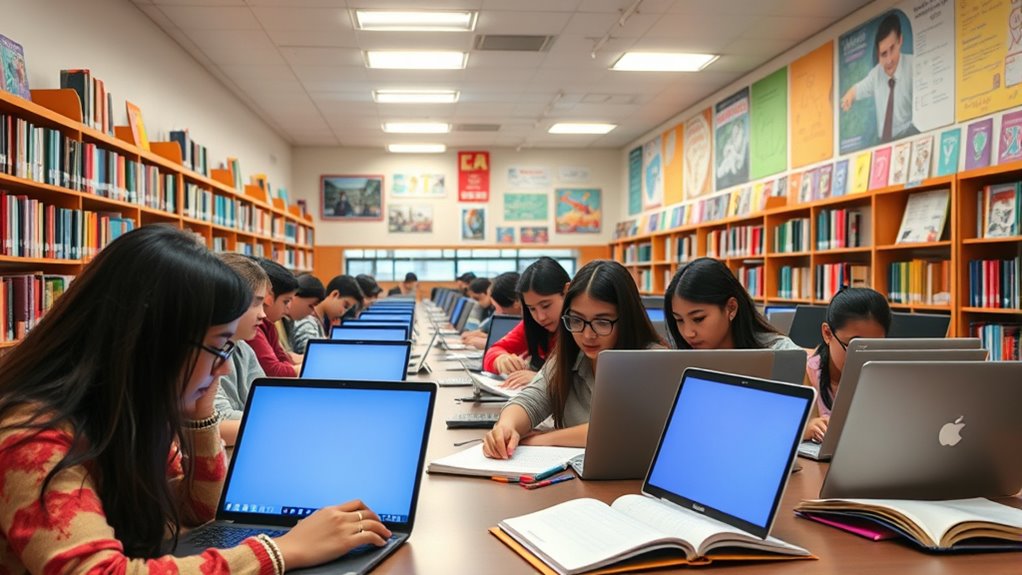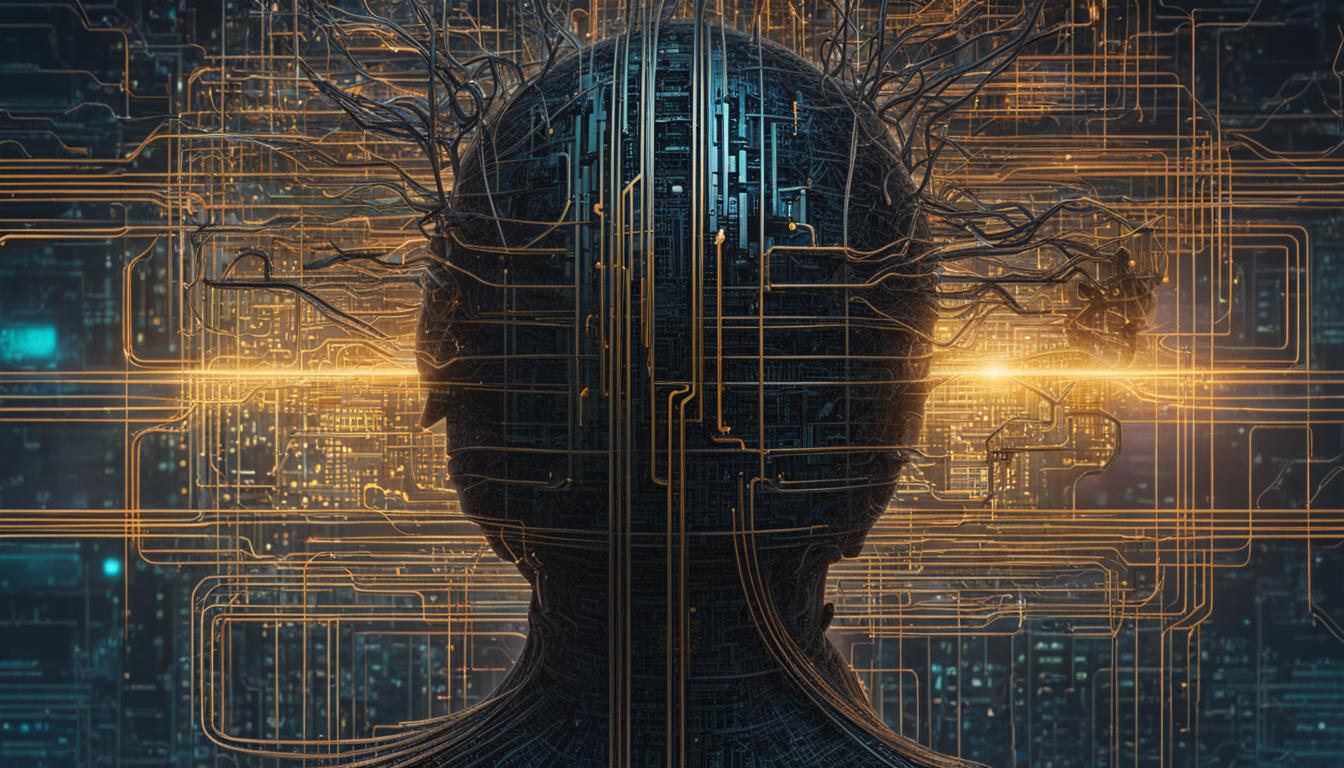Many high school students now turn to ChatGPT instead of teachers or tutors for homework help because it offers quick answers, explanations, and essay drafts. This shift shows a preference for convenience and instant support, altering how students approach learning tasks. While AI tools like ChatGPT are increasingly popular, using them responsibly is important for ethical learning. Keep exploring to see how this trend is shaping education and what it means for your studies.
Key Takeaways
- Many high school students now prefer ChatGPT over teachers and tutors for homework assistance.
- The convenience and quick responses of ChatGPT make it a popular choice among students.
- The shift raises concerns about reliance on AI, potentially impacting critical thinking skills.
- Schools are developing policies to regulate AI use while promoting ethical and responsible usage.
- Assessments are evolving to focus on skills that AI cannot easily replicate, like originality and reflection.

A recent survey reveals that a significant number of high school students turn to ChatGPT to complete their homework. This shift highlights how AI-powered tools are reshaping the way students approach learning. Instead of relying solely on teachers or tutors, many now prefer ChatGPT for quick answers, explanations, and even essay drafts. While convenience is a major factor, it also raises important questions about AI ethics and educational policy that you should consider.
Many students now use ChatGPT for homework, raising questions about AI ethics and educational policies.
When you use ChatGPT for homework, you’re engaging with an AI that can generate detailed responses based on vast amounts of data. However, this convenience comes with ethical concerns. AI ethics emphasize transparency, fairness, and accountability, which become complex when students depend heavily on AI to do their work. If students lean on ChatGPT without understanding how it generates answers, they risk bypassing critical thinking and learning processes. Educational policy needs to evolve to address these challenges. Schools are beginning to develop guidelines about AI use, aiming to strike a balance between leveraging technological advancements and maintaining academic integrity. You might see policies that encourage students to use ChatGPT as a supplementary tool rather than a shortcut to completing assignments.
This shift prompts educators to reconsider traditional assessment methods. If students increasingly turn to AI, then tests and essays must evolve to evaluate skills that AI can’t easily replicate—like original thought, personal reflection, and problem-solving. As a student, you should recognize the importance of developing these areas to avoid over-reliance on AI. Educational policy might soon incorporate specific rules about citing AI assistance or setting boundaries on its use. These policies aim to guarantee that AI enhances learning rather than undermines it.
Additionally, understanding the role of AI in education can help students and teachers navigate this evolving landscape responsibly. Furthermore, the integration of AI tools like ChatGPT into education requires careful regulation to address potential misuse. Schools need to implement strategies that promote ethical use—such as teaching students about AI ethics and responsible behavior online. As you navigate this new landscape, understanding the ethical implications of AI use becomes vital. It’s not just about getting answers faster but about fostering a learning environment that values honesty, originality, and critical thinking. Educational policy should serve as a framework to guide responsible AI integration, helping students benefit from technological advancements without losing sight of fundamental educational principles.
Frequently Asked Questions
How Do Students Feel About Relying on Chatgpt for Homework?
You might feel confident using ChatGPT for homework, as it offers quick, accessible answers. However, you could also worry about dependency concerns, fearing that relying too much on AI might weaken your problem-solving skills and student confidence. While ChatGPT can be a helpful tool, it’s important to balance its use with traditional learning methods to stay truly engaged and develop your understanding.
Are There Any Academic Integrity Concerns With Chatgpt Use?
Using ChatGPT for homework can be a double-edged sword, like walking a tightrope. It raises plagiarism concerns and challenges academic honesty, as students might pass off AI-generated work as their own. While it’s a handy tool, it’s vital to use it ethically. Remember, the goal is to learn, not just to complete assignments—so always cite sources and guarantee your work reflects your understanding.
What Subjects Do Students Most Frequently Use Chatgpt For?
You’ll find students most frequently use ChatGPT for subjects like English, history, and science. These subject preferences often reflect their study habits, as they seek quick explanations, essay ideas, or help with complex concepts. ChatGPT becomes a handy tool to supplement traditional learning, but it’s essential to balance its use with active studying to guarantee understanding and academic integrity.
How Do Teachers Perceive the Rise of Chatgpt in Homework Help?
Like Icarus flying too close to the sun, teachers feel uneasy about ChatGPT’s rise, facing resistance due to ethical dilemmas and concerns over academic integrity. They worry it might weaken critical thinking skills and challenge traditional teaching methods. While some see it as a helpful tool, many teachers are cautious, aiming to balance embracing technology’s benefits with maintaining honest learning, much like steering a delicate tightrope.
Will Schools Implement Policies on Chatgpt Use in the Future?
Schools will likely develop policies on ChatGPT use in the future, focusing on policy development and ethical considerations. You might see guidelines that encourage responsible AI use, set boundaries for cheating, and promote learning integrity. As institutions recognize ChatGPT’s role in education, they’ll aim to balance innovation with ethics, helping you navigate AI tools effectively while maintaining academic honesty. This way, technology supports your learning without compromising integrity.
Conclusion
So, it’s clear that ChatGPT has taken over as the ultimate homework helper for high schoolers. You’re not just using a tool; you’re wielding a digital genius that could outsmart even the smartest teacher. As more students turn to AI for answers, it’s like having a homework superpower at your fingertips. Just remember, while AI is incredible, don’t forget to learn and grow — because even the coolest tech can’t replace your own brain!










